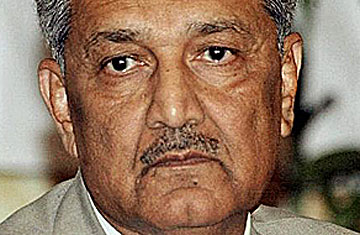
Abdul Qadeer Khan
During his four years under house arrest in Islamabad, Dr. Abdul Qadeer Khan, the father of Pakistan's atomic bomb and self-confessed nuclear black marketeer, was denied visitors and the use of the telephone and Internet. For amusement, he was reduced to placing a sugar cube on an anthill and watching the ants devour it.
Lately, however, Khan has had real company. As President Pervez Musharraf's grip on power weakens, so have the restrictions on the disgraced nuclear scientist still widely hailed as a national hero. Last week, Khan recanted the nationally televised confession he made four years ago, suggesting it had been forced. And calls for his freedom are growing in Pakistan. Khan's rapid rehabilitation is a source of anger and frustration for the Bush Administration, which claims that the scientist was a top trafficker in illegal nuclear arms sales and instrumental in putting Iran and North Korea within reach of the bomb.
Despite President Musharraf's status as a key U.S. ally, his regime had always cited reasons of "national security" for rebuffing all efforts by Washington and the IAEA to interrogate Khan about his alleged weapons trafficking. Prospects are more remote than ever, now, that Khan will be questioned on his full role in running a nuclear arms bazaar stretching from South Africa to Europe and East Asia. Musharraf had forced Khan to make his 2004 confession after the Bush Administration produced evidence linking the Pakistani scientist to Libya's acquisition of nuclear bomb-making technology.
In recent weeks, authorities have relaxed Khan's house arrest, allowing him to make a few visits outside the leafy Islamabad mansion that had become his prison. And once his telephone lines were reconnected, an irate Khan opened up to news media, denouncing Musharraf for forcing him to make the tearful confession on TV in which he took sole responsibility for trafficking nuclear weapons secrets to Iran, Libya and North Korea. The confession, Khan now claims, was "not of my own free will. It was handed into my hand." He dismissed "as Western rubbish" reports that he had helped smuggle atomic secrets and hardware to countries in President Bush's "Axis of Evil." Khan claimed that the bomb-making materiel was available from Western suppliers. "They were supplying to us, they were supplying to them... [to] anyone who could pay," he told the Guardian in a telephone interview.
Despite his anger at Musharraf for letting Pakistan "go to the dogs" and for allegedly failing to honor a private pledge to allow the scientist complete freedom in exchange for his TV confession, Khan was cautious not to attack Pakistan's military brass and the new coalition government. He refused to say whether he was made a scapegoat for an arms-dealing operation that many U.S. and European experts believe the scientist could not have managed without senior military approval. "I don't want to talk about it," Khan said, brushing aside the question of the generals' involvement. "Those are things to forget about."
Since an opposition coalition took power in February, a nationwide campaign led by lawyers, retired generals and the media has pressed for Khan to be released from house arrest and exonerated. Many Pakistanis believe that Musharraf singled out Khan in response to U.S. pressure. Now that Musharraf's absolute sway over politicians and the military is weakening, Khan — alleged father of a new age of rogue nuclear proliferation — looks set to regain his freedom.
